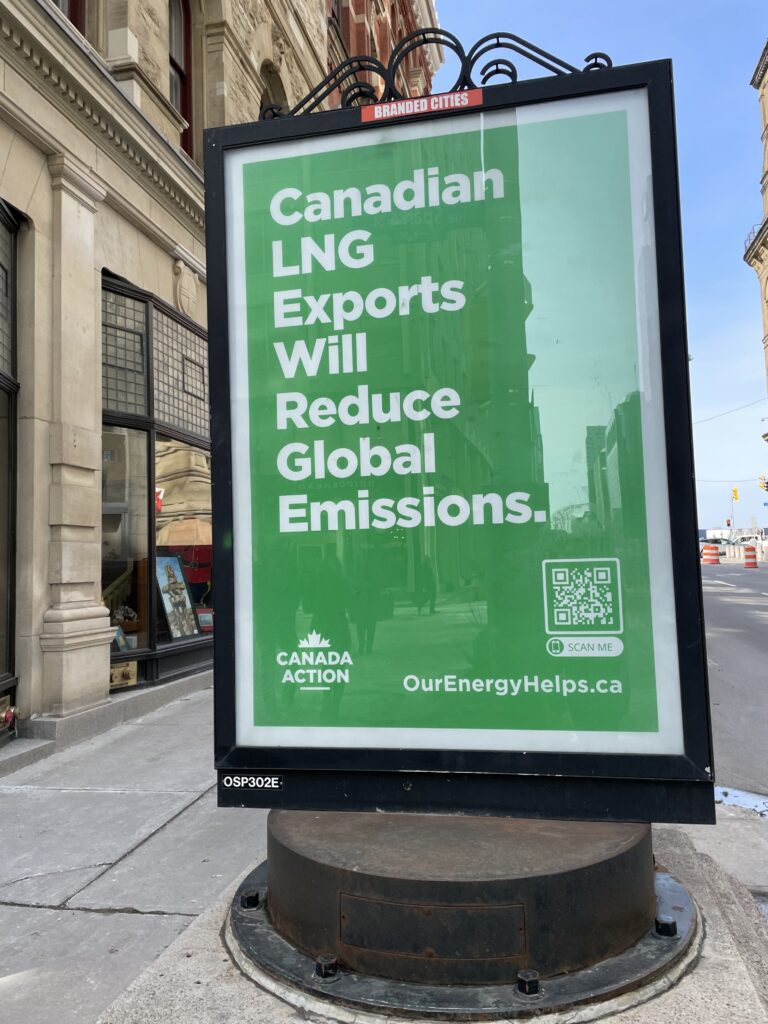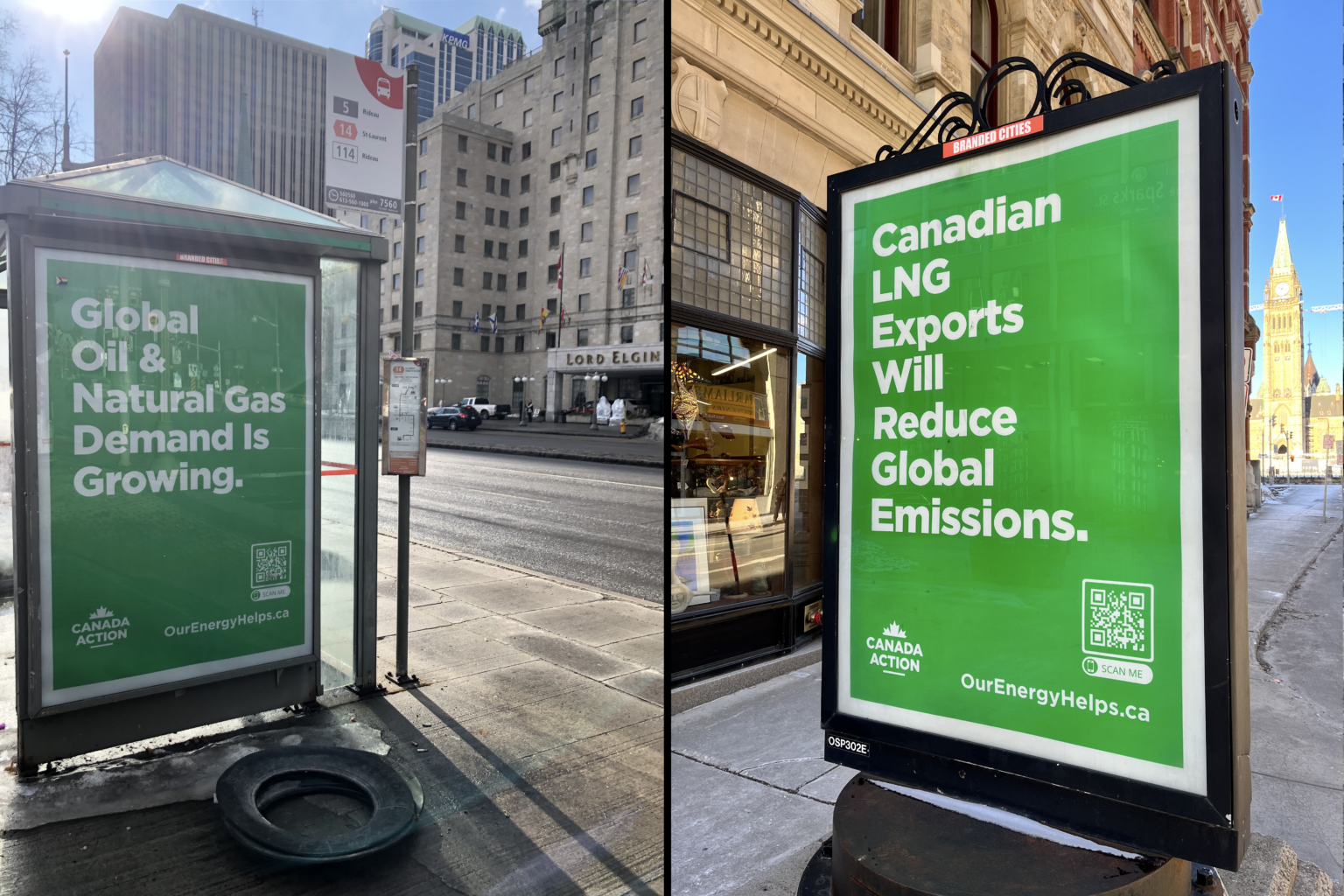Canada’s advertising regulator has determined that ads claiming liquified natural gas (LNG) will lower emissions are inaccurate, misleading, and distort scientific data.
The Ad Standards ruling was shared anonymously with the Canadian Association of Physicians for the Environment (CAPE), which described the pro-LNG ads as “greenwashing.”
“These misleading ads are deeply offensive to every healthcare worker who has to treat patients suffering from the health effects of climate change,” said Dr. Melissa Lem in a statement. Lem is a Vancouver-based family physician and president of CAPE, who described adverse health effects of climate change as including heat illness, asthma exacerbations from wildfire smoke, and anxiety and depression after wildfire evacuations, among others.
The complaint was made against advertisements paid for by Canada Action, a federally-registered non-profit organization that promotes resource development in Canada, particularly the fossil fuel sector. Canada Action uses traditional and social media to advocate for the resource sector, and leads publicity campaigns in support of the Alberta tarsands, pipeline expansion, and LNG development.
Canada Action’s ads claimed that “B.C. LNG will reduce global emissions.” Similar ads run by Canada Action appeared on transit, public buildings, and billboards in Ottawa earlier this year. Those ads read “Canadian LNG exports will reduce global emissions.” In an emailed statement, Canada Action founder Cody Battershill said his organization is complying with the Ad Standards process and has “a substantial amount of evidence” to support the LNG claims.
Though Ad Standards made its ruling in late January, they only made their decision known to both advertiser and complainant on May 7. Ad Standards further stated that the advertiser has appealed their decision. An Ad Standards representative said the delay was due in part to a backlog of complaints.
Founded in 1994, CAPE is a physician-directed non-profit organization that describes itself as having worked “to secure human health by protecting the planet.”
Ad Standards is a national not-for-profit advertising self-regulatory organization in Canada. The organization reviews consumer complaints made against the Canadian Code of Advertising Standards.
Canada Action ads ran in newspapers, and on billboards and transit, according to the complaint. The ads included the url BCLNGHelps.ca, which leads to a page hosted on the Canada Action website. The transit ad included an additional claim that “the world is asking for Canadian energy.”
Whether the world is asking for Canadian energy is difficult to determine. Most of Canada’s oil exports are to the United States, and those exports tend to increase when cheaper foreign sources aren’t available. And according to recent data from Statistics Canada, Canadian LNG exports actually fell by nearly 3 percent in December of 2023, at precisely the time LNG exports were expected to increase. According to a report issued by the Institute for Energy Economics and Financial Analysis (IEEFA) in March 2024, increasing Canada’s LNG export capacity makes no sense at the present time, given indicators are pointing strongly towards a global LNG glut developing in the near term.
The complaint description further reads that the newspaper version of the ad was accompanied with sub-texts explaining how British Columbia LNG projects could reach goals of sustainability, affordability and reliability. Similar points are listed on the Canada Action website.
The complainants argued that the ads promoted misinformation about the effects of LNG on the environment. The complainants identified several problems with the ads, including: that the ads conveyed the idea that LNG generates fewer greenhouse gas (GHG) emissions; that by using the word “will” the ads imply a definite outcome that could not be guaranteed; and, that the bright green background colour featured in the ads insinuated that LNG was environmentally-friendly. The complainants argued that, taken together, Canada Action’s ads amounted to a deliberate greenwashing attempt.
Ad Standards unanimously agreed with the complainants, writing in their decision that Canada Action’s ads “distorted the true meaning of statements made by professionals or scientific authorities,” and that they “promised a verified result without competent and reliable evidence.” In addition, Ad Standards determined the ads created an “overall misleading impression that B.C. LNG is good for the environment, amounting to greenwashing.”
Misleading Ads Still Running
Canada Action’s misleading ads continue to run, particularly in large urban centres in Ontario and British Columbia, even as they appeal the Ad Standards decision. These have included ads on radio, billboards, and public transit. According to CAPE, Canada Action also ran a full-page, front-cover advertisement in Victoria’s Times Colonist newspaper as recently as May 4. Victoria is the capital of British Columbia and the home of the provincial legislature. In their statement, CAPE explained that, unlike Ad Standards’ equivalents in the United States or the United Kingdom, their decisions are not made public. Ad Standards refutes CAPE’s claims that its decisions are not public. In a statement, Ad Standards said: “Due to egregious violations of confidentiality in this case, by the leaking of this decision which was not final, we will only be advising the advertiser of the outcome of the appeal. We will not be able to report the results of that decision publicly, or to comment further.”

Recently, Canada Action ran an advertising campaign in and around Ottawa that prompted local civic organizations to propose banning fossil fuel ads from the city’s public buildings, spaces, and public transit. Canada Action, along with the Canadian Association of Petroleum Producers (CAPP — a fossil fuel industry lobby group), and the Canadian Taxpayers’ Federation (a climate change denying libertarian anti-taxation group affiliated with the Atlas Network) were running dozens of pro-fossil fuel or anti-carbon tax advertisements throughout the city, from late 2023 through the early months of 2024.
Member of Parliament Charlie Angus proposed a national ban on fossil fuel advertising in February, arguing that advertising for the fossil fuel sector should be banned in the name fashion as advertising by Big Tobacco was in the 1990s. Canada’s right-wing was quick to oppose Angus’ proposal, with a flood of misleading and inaccurate editorials published by the National Post and other newspapers run by Postmedia, a Canadian newspaper network owned by US-based hedge fund Chatham Asset Management, LLC. DeSmog later discovered one of the most vocal opponents of the ad ban proposal — Stephen Buffalo of the Indian Resource Council — had received $450,000 from a Canadian oil company.
According to CAPE, Canada Action — which claims to be a grassroots effort to support the resource sector — has spent more than $5 million in advertising between 2017 and 2022. On their website’s funding section, Canada Action claims it raises funds through personal donations and selling pro-resource merchandise. CAPE claims that Canada Action has reported $7 million in corporate sponsorship, while previous reporting from The Narwhal indicates Canada Action received at least $100,000 from ARC Resources, a Canadian oil company.
For their part, CAPE fully supports the proposed ad ban, particularly in light of the Ad Standards’ ruling.
“Just as Canada’s ban on tobacco advertising protects public health, we need a ban on fossil fuel advertising to stop stoking demand for products that harm our health,” said CAPE’s Dr. Melissa Lem. Using data and research presented in the April 2021 edition of Environmental Research, the Canadian Health Association for Sustainability & Equity (CHASE) determined air pollution linked to the fossil fuel sector is responsible for 34,000 premature deaths per year in Canada, roughly 10,000 more Canadians than who died in the first year of the COVID pandemic.
‘Wake-up Call’
“Let this be a wake-up call to the B.C. government,” said Dr. Margaret McGregor, family physician and health policy researcher. “LNG is no climate solution. There is increasing evidence of higher rates of impaired fetal growth, premature birth, asthma flares, childhood leukemia, heart failure, and mortality in communities exposed to the fracking industry. It is time for the BC government to consider the emerging science on fracking and human health in their energy policy decision-making.”
“These ads are textbook cases of greenwashing, right down to the colour of the ads,” said Lem. “We felt compelled to make this decision public because people in Canada have the right to not be misled about LNG’s harmful impacts on the climate, the environment and our health.”
In their response to Ad Standards, Canada Action argued that transitioning from coal to gas prevented 500 million tonnes of carbon dioxide from entering the atmosphere since 2010. Canada Action further argued that, at its end use, gas emitted 50 percent less carbon than coal. They further argued that gas exports would lower CO2 emissions related to burning coal for energy, particularly in Asia.
Though these may seem like convincing arguments, they are also misleading. Because of substantial methane leaks at every step of the gas production process (and methane’s significantly worse effect on the atmosphere than carbon dioxide), environmentalist Bill McKibben has argued LNG may in fact be worse for the environment than burning coal. Canada’s underreported methane leak problem has been described as a “planetary superheater.” In addition, the widely held belief that Canadian LNG exports could help Asia get off coal may be considerably overstated. According to a recent study by the IEEFA, the likelihood of Asian LNG demand increasing is unlikely, while the possibility for a global glut looks increasingly likely. The idea that LNG is a possible bridge fuel has also been soundly debunked, namely because the use of any fossil fuel is counter-productive when it comes to climate change mitigation, and further still because it saps resources away from more effective decarbonization methods, such as increasing the use of fully renewable energy resources.
“The fossil fuel industry is exploiting gaps in Canada’s regulatory system to confuse and mislead the public about how their products harm the environment, public health, and the economy,” said Leah Temper, CAPE’s Health and Economic Policy Program Director, in a statement. “It is unconscionable that corporate interests can spend millions lying to the people of Canada and that the public doesn’t have the right to learn the truth even when they are caught out. The system is broken and we need government action to stop the greenwash and to shut down the disinformation machine.”
Subscribe to our newsletter
Stay up to date with DeSmog news and alerts






